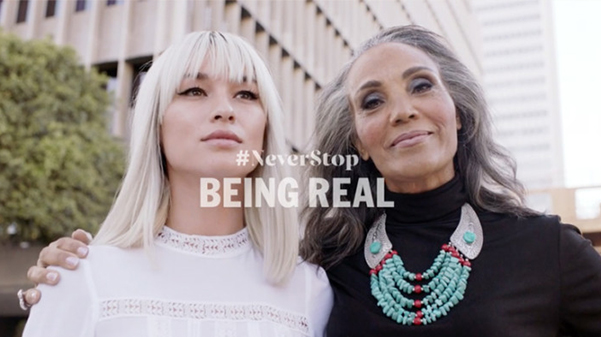With Millennials now all over natural beauty and body positivism, what about the older generation? Fashion designers, cosmetic brands, and the media are trying to strike up a conversation about identity, beauty, and bodies among the over-50’s.
Luxury fashion houses, up-and-coming brands, and the mass market are now all coming up with advertising campaigns that give pride of place to diversity in gender, shape, and culture. This is a trend that has been running for a few seasons on catwalks from New York to Paris and is growing ever stronger.
A study carried out by The Fashion Spot reveals that there are seven times more 50+ models in Fall-Winter 2017’s advertising campaigns than there was the previous season. Actress and icon Isabella Rossellini appears in the latest Sies Marjan collection, by Bruce Weber; Frédérique Sebbagtakes ceter stage at Y/Project in a series of photos celebrating individuality; and we have Kristin Scott Thomas at Valentino and Lauren Hutton for Calvin Klein, the latter of whom is now one of the label’s lingerie stars, after walking the runway for Bottega Veneta.
PRIDE OF PLACE FOR DIVERSITY
Rashida Jones, Maya Hawke, Chase Sui Wonders, Nathalie Love, Laura Harrier, and Kirsten Dunst. Seven stars, models and actresses whose ages range from 18 to 73.
Austrian label Helmut Lang, currently making its big comeback, has an intergenerational aim, with a campaign by New York photographer Ethan James Green, and starring the likes of Larry Clark, Alanie Quinones, Traci Lords, and Mari Copeny.
New Zealand underwear brand Lonely is well known for its campaigns highlighting the diversity of women’s bodies, and the brand is maintaining its reputation, this time around by making 56-year-old Mercy Brewer its muse, for her ‘affable attitude towards ageing’, in order to ‘challenge what we see in our media with a more authentic reflection of beauty and hope to grow people’s visual vocabulary.’ (Helene Morris, founder of Lonely)
“The reality is we are all ageing, and there are so many wonderful things about growing older. So often the primary message around age is intervention, which is a frustrating response to such a natural, inevitable process.”
BEAUTY IN ALL ITS FORMS
While the world of beauty is still largely dominated by an image of youthful femininity that’s synonymous with perfection, the rulebook is actually beginning to evolve. Among digital natives, self-acceptance, body positivism, and natural beauty are the watchwords. They are now posting photos of themselves makeup-free and worry-free, on social media. Imperfections are becoming a way of standing out, ‘the new sophistication is to accept one’s singularity.’
More and more care and cosmetics brands are surfing this wave in order to address all women – think the new Glossier campaign to promote the brand’s latest body care, called Body Hero, or the militant commercial Fight For Natural Beauty by LPG, world leader in cell stimulation, which extols natural beauty, and is highly critical of the excesses of plastic surgery and the eternal quest for youth.
Sephora’s #NeverStop campaign on Facebook, Instagram, and Snapchat also gives pride of place to an authentic, varied vision of beauty through five faces with different looks, backgrounds, and ages.
“We have a very active and engaged audience that is constantly sharing and supporting each other, beyond the product,” said Alison Stiefel, VP of campaign and content marketing at Sephora. “With this campaign, we are encouraging a deeper conversation with our followers about what beauty means to them, celebrating each other and ultimately give a voice to how we can all ‘beauty together.’
REWRITING THE RULE BOOK
In her latest book, entitled ‘Une apparition’, as well as on Instagram, Sophie Fontanel tells of how she came to accept her gray hair, while the ‘silver trend’ is bigger than ever, as evidenced by the runways at the latest fashion weeks and the new Chanel FW 17-18 campaign with Cara Delevingne. Meanwhile, on Instagram, over a million women (and men) of all ages are sharing with the #GreyHair hashtag, and close to 300 000 are using the hashtag #grannyhair. Essayist Anne Kreamer says that ‘the most provocative political statement a woman can make with her hair is to leave it naturally grey’, echoing the individual empowerment described by philosopher and psychoanalyst Cynthia Fleury as a capacity to go beyond society’s inhibitions and take the risk of being oneself.

Article produced by Peclers Paris: http://www.peclersparis.com/

